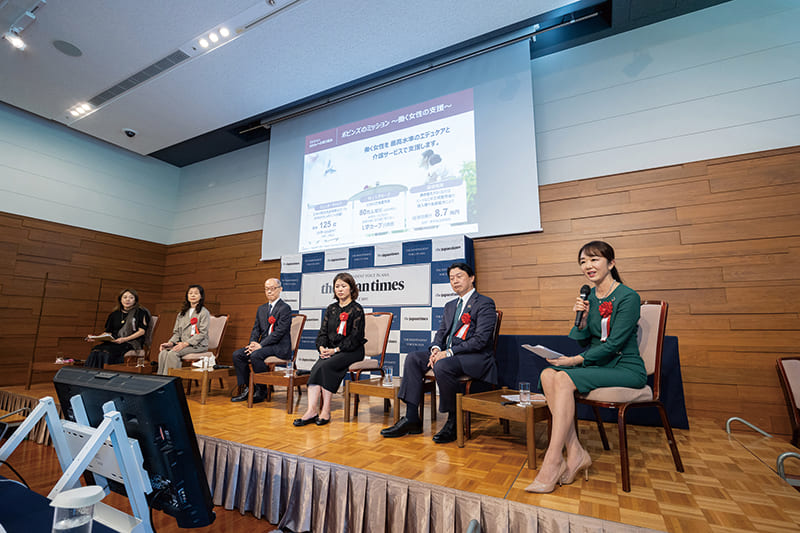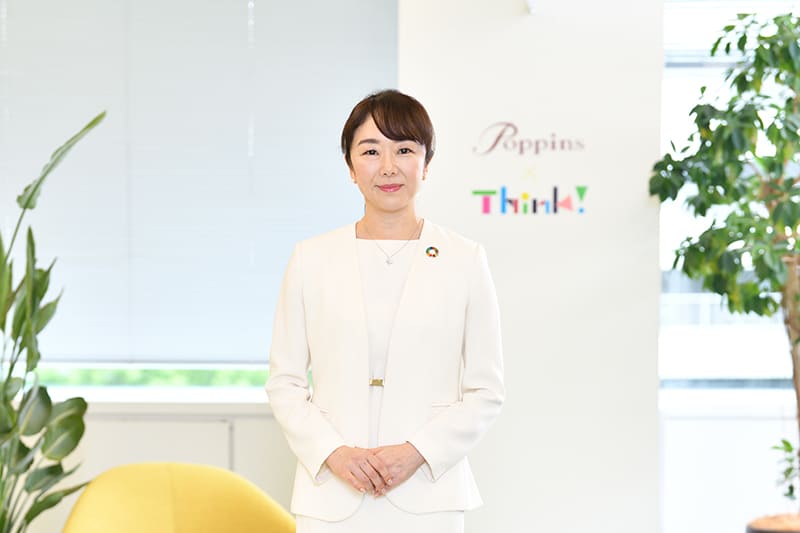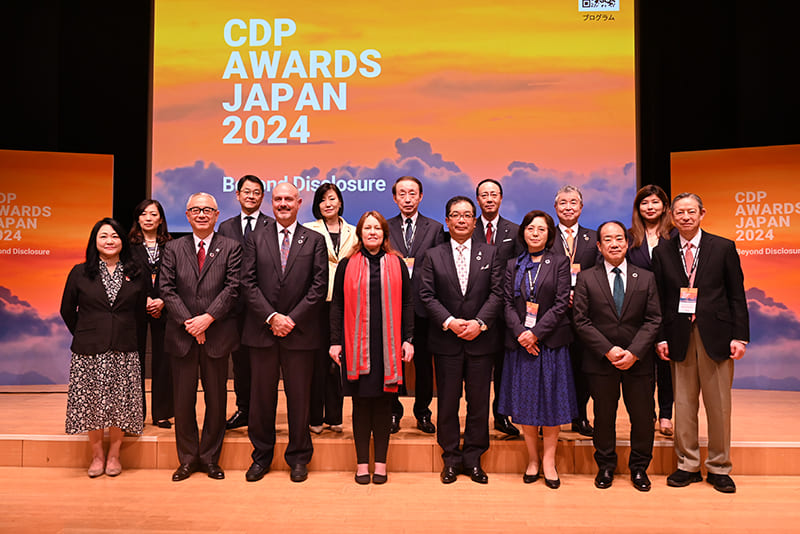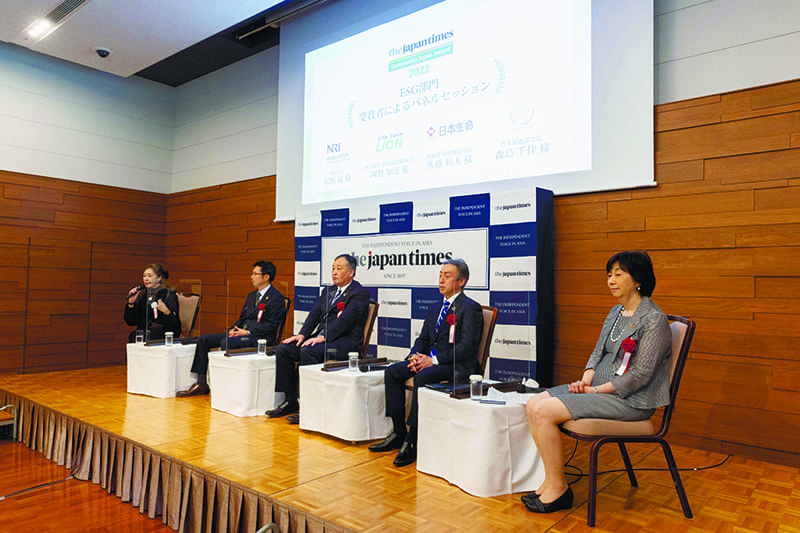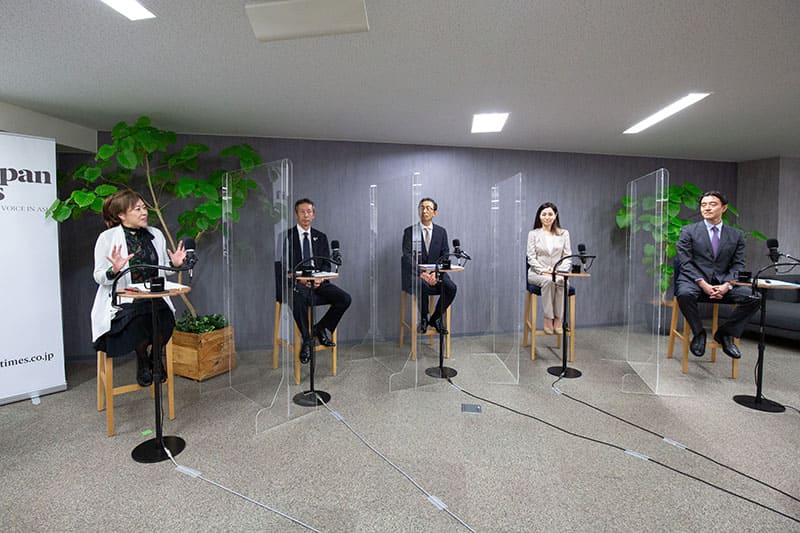October 02, 2023
ESG winners create answers to societal problems
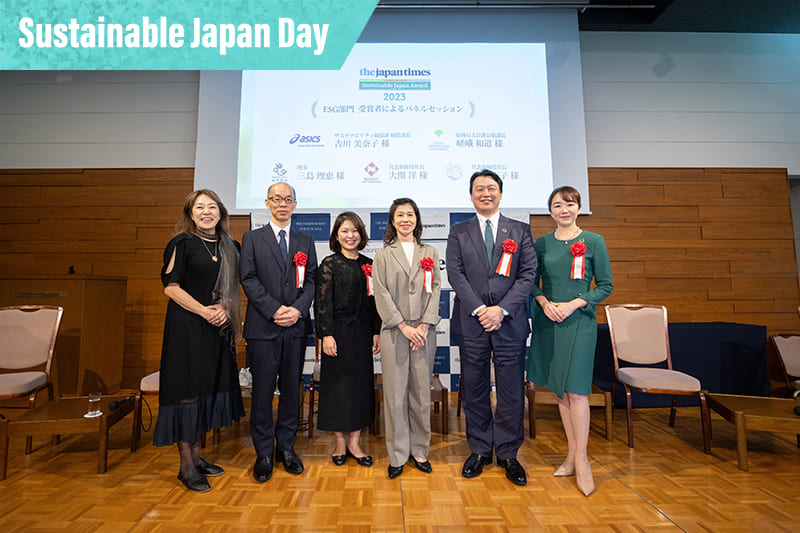
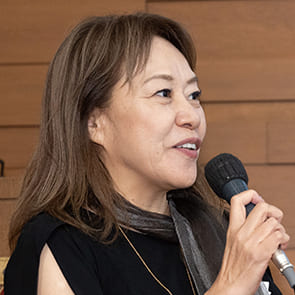
Senior lead of PRI
The panel session featuring five Sustainable Japan Award recipients in the ESG category delved into societal challenges, sharing pioneering initiatives aimed at fostering a society that leaves no one behind. The panel featured speakers from Grand Prize winner Asics, Excellence Award winners Nissay Asset Management Corp. and Poppins Corp., and Special Award winners the Tokyo Metropolitan Government and the Certified Nonprofit Corporation Nationwide Children’s Cafeteria Support Center, Musubie. Michiyo Morisawa, head of the PRI Secretariat Japan and director of CDP Japan, moderated the panel.
Asics’ quality, sustainability
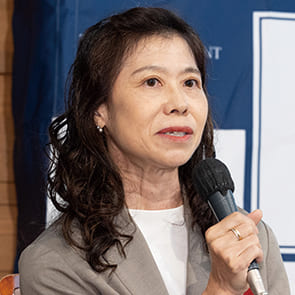
General manager, Sustainability Division, Asics Corp.
Minako Yoshikawa, general manager of Asics’ Sustainability Division, emphasized that sustainability lies at the company’s core. Asics is committed to promoting health through sports, and envisions a world where future generations can fully engage in sports activities. Keeping this in mind, Asics has set ambitious targets: to achieve net-zero emissions by 2050 and to reduce emissions of carbon dioxide by more than 60% by 2030.
To achieve these goals, Asics collaborates with numerous stakeholders, pursuing innovation alongside suppliers and consumers. Its Gel-Lyte III CM 1.95 sneaker, with the world’s lowest CO2 emissions at 1.95 kilograms per pair, stands out as a notable example.
This sneaker incorporates carbon-negative foam sourced from sugarcane, achieving a net negative environmental impact by offsetting more CO2 than it emits. Furthermore, the company provides a clear visualization of the product’s CO2 emissions over its life cycle, allowing consumers to easily understand its environmental impact. Yoshikawa said, “It gives us great confidence that we were able to achieve the lowest CO2 emissions without compromising quality and functionality.”
ASICS prioritizes collaboration with its global production plants and suppliers to ensure both quality and sustainability. The company has instituted a green procurement policy to realize this, encouraging suppliers to establish environmental objectives and collaborate closely.
Yoshikawa remarked, “While some suppliers express concerns over requirements such as transitioning to renewable energy, meeting these standards is essential to stay competitive. Thankfully, many suppliers align with our policy and partner with us willingly. Consumers are also beginning to demand products with low CO2 emissions.”
TMG: ESG bonds, social impacts
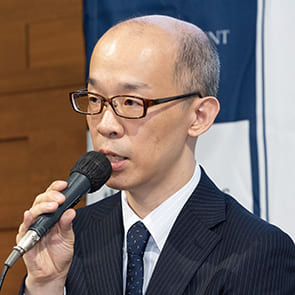
Director of the Bond Section in the Budget Division of the Tokyo Metropolitan Government Bureau of Finance
Similarly, recognizing the urgency of sustainability initiatives, local governments are not lagging behind. The Tokyo Metropolitan Government, for one, is making strides of its own.
The TMG is dedicated to upholding its reputation as a top international financial city in Asia and places a strong emphasis on developing a green finance market. In 2017, the TMG issued Japan’s first green bonds, followed by social bonds in 2021. Over 800 institutional investors and more than 30,000 individual investors have invested in Tokyo’s ESG bonds.
Kazumichi Saga, director of the Bond Section in the Budget Division of the city’s Finance Bureau, remarked: “We outline the use of ESG funds in advance. Those who align with the content of the announcement invest in the bonds. The support we’ve received from numerous institutional and individual investors underscores the significant success of our ESG bond initiatives.”
Regarding the green bond initiatives, the TMG has set an ambitious target of sourcing 50% of its electricity from renewable energy by 2030. Additionally, facilities directly operated by the TMG have set a goal to power 100% of their operations with renewable energy by the same year.
Among the specific projects financed through the green bonds are efforts to install solar power systems in schools, metropolitan housing, fire stations and other metropolitan facilities, all aimed at enhancing their environmental responsiveness. Another significant endeavor is the construction of a large-scale underground water-control basin beneath the city center. This project aims to mitigate river overflow during extreme weather events like torrential rains. With its completion set for 2025, this facility will boast a capacity roughly 12,000 times that of a 25-meter swimming pool, greatly reducing the risk of flooding in the city center.
Funds raised through the social bonds have been allocated to specific projects, primarily focused on disaster prevention measures, such as the removal of utility poles.
To keep its stakeholders informed, the TMG releases an impact report that transparently conveys both the allocation of funds and the resulting environmental and social impacts after the ESG bonds are issued. To ensure the transparency and objectivity of the report, it undergoes an external evaluation. English translations of the documents are prepared concurrently to cater to the international investor community.
Musubie’s open cafeterias
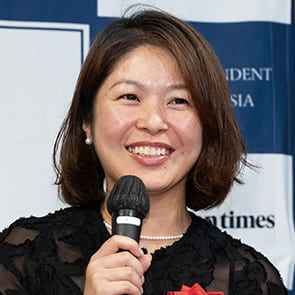
Director, Nationwide Children’s Cafeteria Support Center, Musubie
Musubie operates kodomo shokudō, or children’s cafeterias, across Japan. Established in 2012, these cafeterias offer meals to children at minimal or no cost, providing a warm, welcoming environment for all visitors. Since the establishment of the first children’s cafeteria in 2012, these venues have proliferated across Japan, serving as hubs for interaction among children, parents, the local elderly and multiple generations. By fiscal year 2022, the number was reported to have exceeded 7,000.
While the term “children’s cafeterias” might suggest places exclusively for children, they often serve as gathering places for everyone. They offer a supportive environment for the local community, addressing issues such as child poverty and solitary dining, while also supporting child-rearing and promoting the health and well-being of the elderly.
The children’s cafeterias garner significant support from various companies and organizations. In the past year, 435 such entities have collaborated in different ways, including donating foodstuffs and funds. Local farmers have also generously contributed rice and vegetables. With the backing and cooperation of the entire community, the children’s cafeterias continue to thrive.
Rie Mishima, director of the nonprofit, said: “People supporting children’s cafeterias from Hokkaido to the remote islands of Okinawa are taking their own leadership in promoting these activities. We believe that the presence of such dedicated individuals across Japan brings hope to our society. The children’s cafeteria, like parks, has become a place where children and the elderly gather, playing a pivotal role in empowering women, providing the elderly with a sense of purpose, supporting child-rearing and preventing children from being solitary. Our ambition is to amplify this initiative further and collaborate with even more people.”
Nissay: Sustainable investment
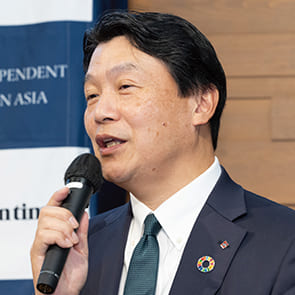
President and chief executive officer, Nissay Asset Management Corp.
Nissay Asset Management, a subsidiary of Nippon Life Insurance, is a global investment company with total assets under management amount to ¥34 trillion ($225 billion, as of March 2023). The company has been an early adopter of ESG initiatives among Japanese asset managers. It was one of the first signatories to the United Nations’ Principles for Responsible Investment (PRI), launched in 2006.
The company prioritizes ESG-focused investments, studying their effects on businesses. Based on evaluations of environmental, social and governance factors, the firm invests in companies with strong ESG ratings for medium- to long-term investments.
Hiroshi Ozeki, its president and chief executive officer, notes that businesses emphasizing sustainability now often see better revenues and growth. While performance-driven investments once dominated the market, public awareness has shifted following the Paris Agreement, favoring companies excelling in both performance and ESG practices.
Its detailed research and analysis showed that, for instance, 10% of the companies in its portfolio were responsible for 90% of the total emissions. In this situation, engaging with those companies through dialogue and cooperation, is crucial to guide them toward more sustainable paths.
Ozeki said, “Ensuring that companies have concrete plans for carbon neutrality and actively supporting them is the key to realizing a truly sustainable society.”
As ESG becomes a focal point in today’s investment landscape, the company is using it as a key selection criterion. However, Ozeki stressed that it is not simply enough to invest in companies with strong ESG credentials. He believes it is equally vital to actively support and engage with high carbon-emitting companies. Ozeki argues that genuine efforts to cut CO2 emissions and continuous improvement can earn a company significant recognition from markets and peers. This can strengthen supply chains and open new business avenues. In line with this, Yoshikawa from Asics suggested that a commitment to sustainability could very well be a game-changer, giving companies a competitive edge.
Poppins helps working women
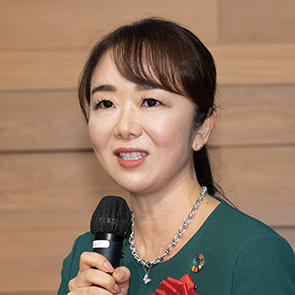
President and CEO, Poppins Corp.
From expansive corporations and government bodies to essential sectors like child care, ESG values are gaining prominence. Poppins Corp., a notable name in the child care industry, is at the forefront of integrating these values into their operations.
Over the 36 years since its founding, Poppins has been dedicated to supporting working women. The company offers a range of services, including day care centers, child care for schoolchildren, nanny and babysitting services, as well as home care. In 2020, Poppins received a second-party opinion from the Japan Research Institute and proudly became Japan’s first company focused on the U.N.’s sustainable development goals (SDGs) to be listed on the First Section of the Tokyo Stock Exchange.
Maiko Todoroki, president and CEO of Poppins, said that although strides have been made in women’s working conditions in Japan since the company’s inception, there is still much to address. Globally, Japan ranks 125th out of 146 countries in gender equality, a disheartening position considering the high educational levels of Japanese women. Yet systemic issues, like losing a large tax deduction if a spouse makes more than ¥1.5 million a year, hinder many from fully engaging in the workforce after major life events like marriage or childbirth. Todoroki suggests that addressing and eliminating these issues could potentially inject an estimated ¥8.7 trillion into the Japanese economy.
To address these challenges faced by women, Poppins operates three main business segments to respond to women’s different life stages and various life events.
The Family Care Business offers services such as babysitting, nanny assistance, elderly care and more to address the diverse care needs within households. The Educare Business operates 339 licensed and certified day care centers nationwide to support children’s education and child care. The Professional Business offers advanced insights into early childhood education through joint research with the Harvard Graduate School of Education and other research institutions and educational facilities in Japan and abroad. Recognizing the nation’s declining birthrate, Poppins is also venturing into infertility prevention, aiming to educate and raise awareness about early-stage infertility treatments.
Todoroki remarked, “A world where women shine, society shines and the world changes — with this perspective, we aim to support women from the front lines.”
Morisawa, the moderator, commended Poppins for its leadership in addressing the challenges faced by women and expressed hope that the company will persistently tackle social issues, break down barriers and pave new paths forward.
Joining forces for the future
Morisawa highlighted that collaboration among companies can amplify potential in fostering innovation, developing new business models and driving sustainable initiatives.
Musubie has been actively collaborating with various entities. A standout partnership was with Lion Corp., an oral health care specialist and a previous award recipient. They introduced Ha-goroku, a board game for children. It brings different generations together in children’s cafeterias and educates them about dental hygiene in an entertaining manner. This initiative was rolled out with the involvement of Lion’s employees in children’s cafeterias across the nation.
Nissay Asset Management has a strong commitment to further financial education. The company supports the Beyond SDGs Life Game, a joint initiative between the Kanazawa Institute of Technology and Takara Tomy, and has contributed financial support for its progression. In partnership with the Asahi Shogakusei Shimbun newspaper, they are also spearheading a contest involving comic senryū poems, aiming to boost awareness and knowledge about the SDGs among elementary school kids.
Poppins Corp. also boasts collaborative contracts with over 700 corporations, with its partnership with Itochu Corp. being particularly noteworthy. Itochu has implemented innovative systems such as morning work schedules and the provision of an in-house day care center for employees, the latter being facilitated with the expertise and support of Poppins. These strategic efforts have dramatically increased the birthrate among Itochu’s employees, seeing it surge from 0.6 in 2005 to 1.97. This rate significantly overshadows the national average of 1.3.
Every choice matters
Concluding the panel session, Yoshikawa from Asics underscored that the path to a sustainable society isn’t just in the hands of corporations. Every person has a vital role to play and must step up to the plate. She spotlighted the significant influence consumers wield. By opting for eco-friendly products and factoring in gender equality in their choices, they can be catalysts for profound societal transformation.
Morisawa emphasized the importance of these panel discussions, highlighting the invaluable opportunity they provide for engaging with a wide array of companies, organizations and local governments. She was particularly struck by the considerable number of female participants, lauding it as a “positive stride for women’s initiatives in Japan.”
Amid the unyielding advance of global warming, Japan experienced record-breaking heat this summer. The international community forged the Paris Agreement in response to these pressing challenges, leading numerous countries to act on these environmental issues. Morisawa expressed her earnest hope that Japan will accelerate its efforts.
